JCRB0196 RP-3
Cell information
Cell type:general cells (View Pricing Information)
| JCRB No. | JCRB0196 | Cell Name | RP-3 |
|---|---|---|---|
| Profile | Mouse cell line producing IgM antibody against rat neutrophil. The antibody is harmfull to the rat neutrophil in vivo or in vitro with complement. | Other Name | |
| Animal | mouse | Strain | BALB/c |
| Genus | Mus | Species | musclus |
| Sex | Age | ||
| Identity | not done | Tissue for Primary Cancer | antibody-producing hybridoma |
| Case history | normal | Metastasis | |
| Tissue Metastasized | Genetics | Hybridoma X63 as parent. Rat neutrophil specific IgM production. | |
| Life Span | infinite | Crisis PDL | |
| Morphology | lymphocyte-like | Character | Mouse cell line producing IgM antibody against the rat neutrophil. The antibody is harmfull to the rat neutrophil in vivo or in vitro with complement. |
| Classify | hybridoma | Established by | Gotoh,S. and Sendo,F. et. al. |
| Registered by | Sendo,F. | Regulation for Distribution | |
| Comment | Year | 2000 | |
| Medium | RPMI1640 medium with 10% fetal calf serum. Use Iscov's modified Dulbecco's medium with 10% fetal calf serum when cell dose not grow well. | Methods for Passages | Simple dilution. |
| Cell Number on Passage | not definde. | Race | |
| CO2 Conc. | 5 % | Tissue Sampling | ascites |
| Tissue Type |
| Detection of virus genome fragment by Real-time PCR | |||||||||
|---|---|---|---|---|---|---|---|---|---|
| Detected DNA Virus | not tested | Detected RNA Virus | not tested | ||||||
| Reference | |
|---|---|
| Pubmed id:9748561 | Effect of neutrophil depletion in acute cerebritis. Lo WD,Chen R,Boue DR,Stokes BT Brain Res. 1998 Aug 17;802(1-2):175-83 |
| Pubmed id:9524329 | Selective neutrophil depletion with monoclonal antibodies attenuates ischemia/reperfusion injury in skeletal muscle. Iwahori Y,Ishiguro N,Shimizu T,Kondo S,Yabe Y,Oshima T,Iwata H,Sendo F J Reconstr Microsurg. 1998 Feb;14(2):109-16 |
| Pubmed id:9504889 | Selective depletion of neutrophils by a monoclonal antibody, RP-3, suppresses dextran sulphate sodium-induced colitis in rats. Natsui M,Kawasaki K,Takizawa H,Hayashi SI,Matsuda Y,Sugimura K,Seki K,Narisawa R,Sendo F,Asakura H J Gastroenterol Hepatol. 1997 Dec;12(12):801-8 |
| Pubmed id:8686765 | Role of neutrophils in the pathogenesis of experimental vasculitis. Qasim FJ,Mathieson PW,Sendo F,Thiru S,Oliveira DB Am J Pathol. 1996 Jul;149(1):81-9 |
| Pubmed id:8999285 | Reduced anti-Pseudomonas aeruginosa activity of a cephalosporin, cefodizime, in rats whose neutrophils were selectively depleted by a monoclonal antibody. Araki A,Sendo F Microbiol Immunol. 1996;40(5):333-8 |
| Pubmed id:8027557 | Modulation of the in vivo immune response by selective depletion of neutrophils using a monoclonal antibody, RP-3. III. Enhancement by RP-3 treatment of the anti-sheep red blood cell plaque-forming cell response in rats. Tamura M,Sekiya S,Terashita M,Sendo F J Immunol. 1994 Aug 1;153(3):1301-8 |
| Pubmed id:8473729 | Modulation of in vivo immune response by selective depletion of neutrophils using a monoclonal antibody, RP-3. I. Inhibition by RP-3 treatment of the priming and effector phases of delayed type hypersensitivity to sheep red blood cells in rats. Kudo C,Yamashita T,Araki A,Terashita M,Watanabe T,Atsumi M,Tamura M,Sendo F J Immunol. 1993 May 1;150(9):3728-38 |
| Pubmed id:8473730 | Modulation of in vivo immune response by selective depletion of neutrophils using a monoclonal antibody, RP-3. II. Inhibition by RP-3 treatment of mononuclear leukocyte recruitment in delayed-type hypersensitivity to sheep red blood cells in rats. Kudo C,Yamashita T,Terashita M,Sendo F J Immunol. 1993 May 1;150(9):3739-46 |
| Pubmed id:8478140 | Abrogation of tumor-inhibitory MRC-OX8+ (CD8+) effector T-cell generation in rats by selective depletion of neutrophils in vivo using a monoclonal antibody. Tanaka E,Sendo F Int J Cancer. 1993 Apr 22;54(1):131-6 |
| Pubmed id:8445327 | Inhibition of Corynebacterium parvum-primed and lipopolysaccharide-induced hepatic necrosis in rats by selective depletion of neutrophils using a monoclonal antibody. Sato T,Shinzawa H,Abe Y,Takahashi T,Arai S,Sendo F J Leukoc Biol. 1993 Feb;53(2):144-50 |
| Pubmed id:1338643 | Correlation between reduction of polymorphonuclear leucocytes in glomeruli injected with a newly developed monoclonal antineutrophil antibody and proteinuria in Masugi nephritis. Yaguchi Y,Tomino Y,Ozaki T,Okumura K,Sendo F,Koide H Nephron. 1992;62(4):444-8 |
| Pubmed id:1881586 | Neutrophil as a mediator of ischemic edema formation in the brain. Shiga Y,Onodera H,Kogure K,Yamasaki Y,Yashima Y,Syozuhara H,Sendo F Neurosci Lett. 1991 Apr 29;125(2):110-2 |
| Pubmed id:2120340 | Vascular hyperpermeability induced by tumor necrosis factor and its augmentation by IL-1 and IFN-gamma is inhibited by selective depletion of neutrophils with a monoclonal antibody. Abe Y,Sekiya S,Yamasita T,Sendo F J Immunol. 1990 Nov 1;145(9):2902-7 |
| Pubmed id:2119251 | Modulation of the immune response to transplanted tumors in rats by selective depletion of neutrophils in vivo using a monoclonal antibody: abrogation of specific transplantation resistance to chemical carcinogen-induced syngeneic tumors by selective depletion of neutrophils in vivo. Midorikawa Y,Yamashita T,Sendo F Cancer Res. 1990 Oct 1;50(19):6243-7 |
| Pubmed id:2391449 | Suppression of late phase enhanced vascular permeability in rats by selective depletion of neutrophils with a monoclonal antibody. Sekiya S,Yamashita T,Sendo F J Leukoc Biol. 1990 Sep;48(3):258-65 |
| Pubmed id:2746139 | Selective depletion of rat neutrophils by in vivo administration of a monoclonal antibody. Sekiya S,Gotoh S,Yamashita T,Watanabe T,Saitoh S,Sendo F J Leukoc Biol. 1989 Aug;46(2):96-102 |
| Pubmed id:2424975 | Enhancement of the expression of a rat neutrophil-specific cell surface antigen by activation with phorbol myristate acetate and concanavalin A. Gotoh S,Itoh M,Fujii Y,Arai S,Sendo F J Immunol. 1986 Jul 15;137(2):643-50 |
| Images |
|---|
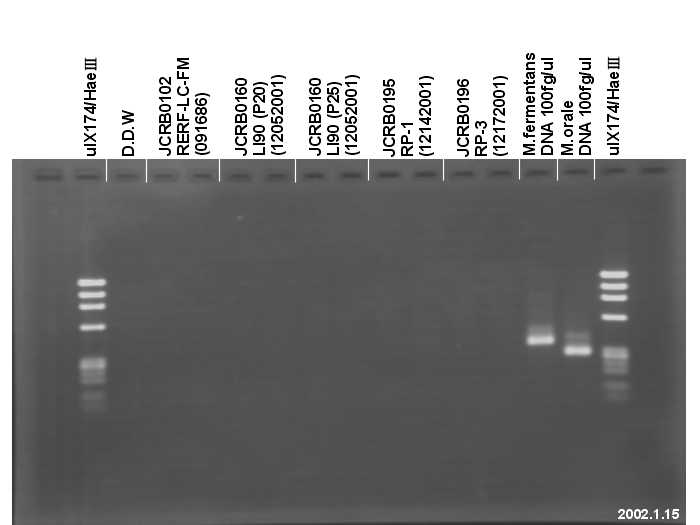 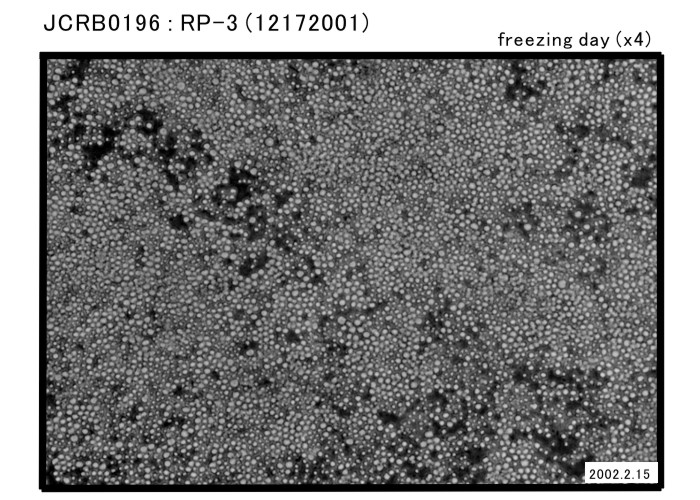 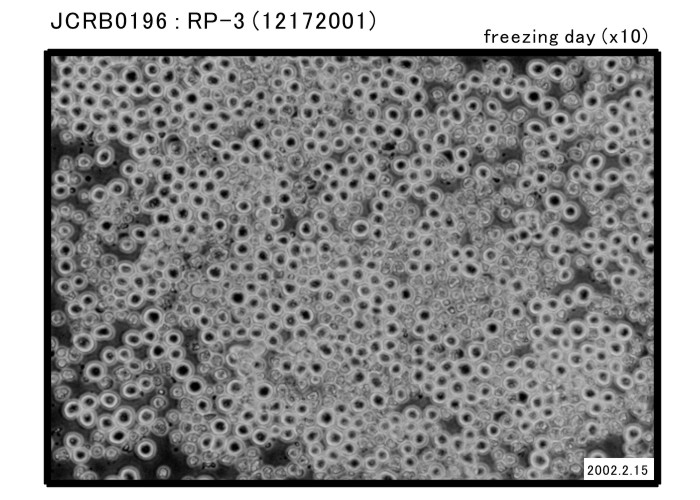 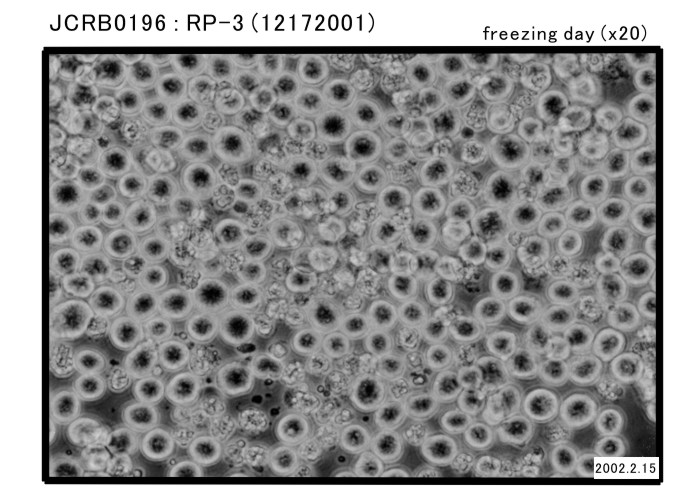 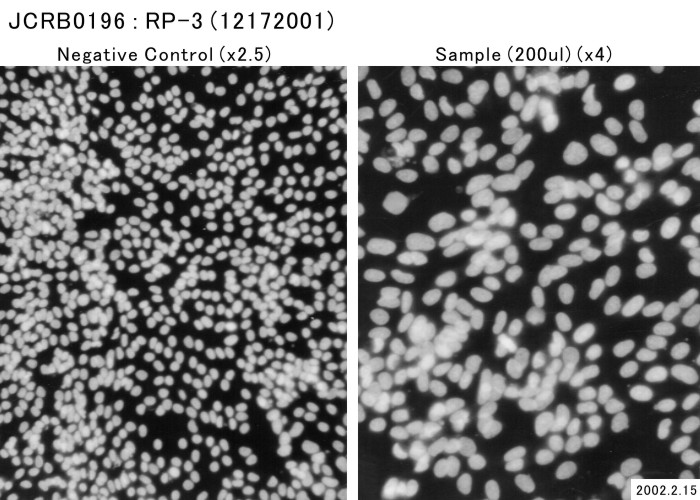 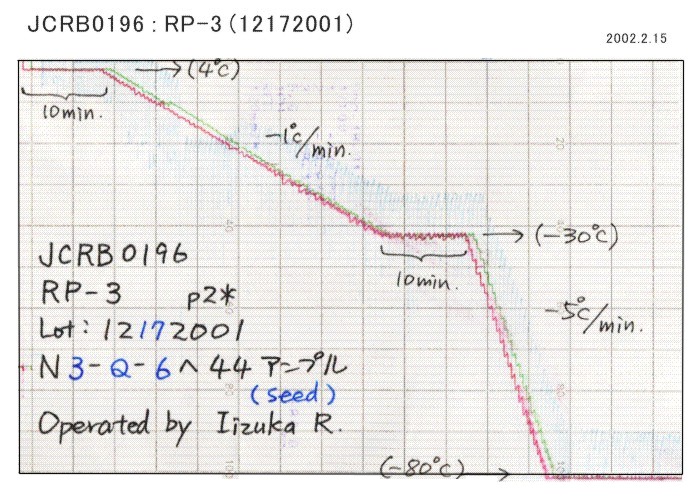 |
LOT Information
| Cell No. | JCRB0196 | Cell Name | RP-3 |
|---|---|---|---|
| LOT No. | 12182001 | Lot Specification | distribution |
| Medium | RPMI1640 medium with 10% heat-inactivated(56C,30min.) fetal bovine serum (Intergen RB52405). | Temperature | 37 C |
| Cell Density at Seeding | 1.7 x 10^5 cells/ml | Methods for Passages | Simple dilution and subculture every 3 days. |
| Doubling Time | NT | Cell Number in Vial (cells/1ml) | 1.2 x 10^6 |
| Viability at cell freezing (%) | 80.5 | Antibiotics Used | free |
| Passage Number | P2* | PDL | NT |
| Sterility: MYCOPLASMA | - | Sterility: BACTERIA | - |
| Sterility: FUNGI | - | Isozyme Analysis | NT |
| Chromosome Mode | NT | Chromosome Information | NT |
| Surface Antigen | NT | DNA Profile (STR) | |
| Adhesion | No | Exoteric Gene | NT |
| Medium for Freezing | Culture medium with 5% DMSO. | CO2 Conc. | 5 % |
| Viability immediately after thawing (%) | Additional information |